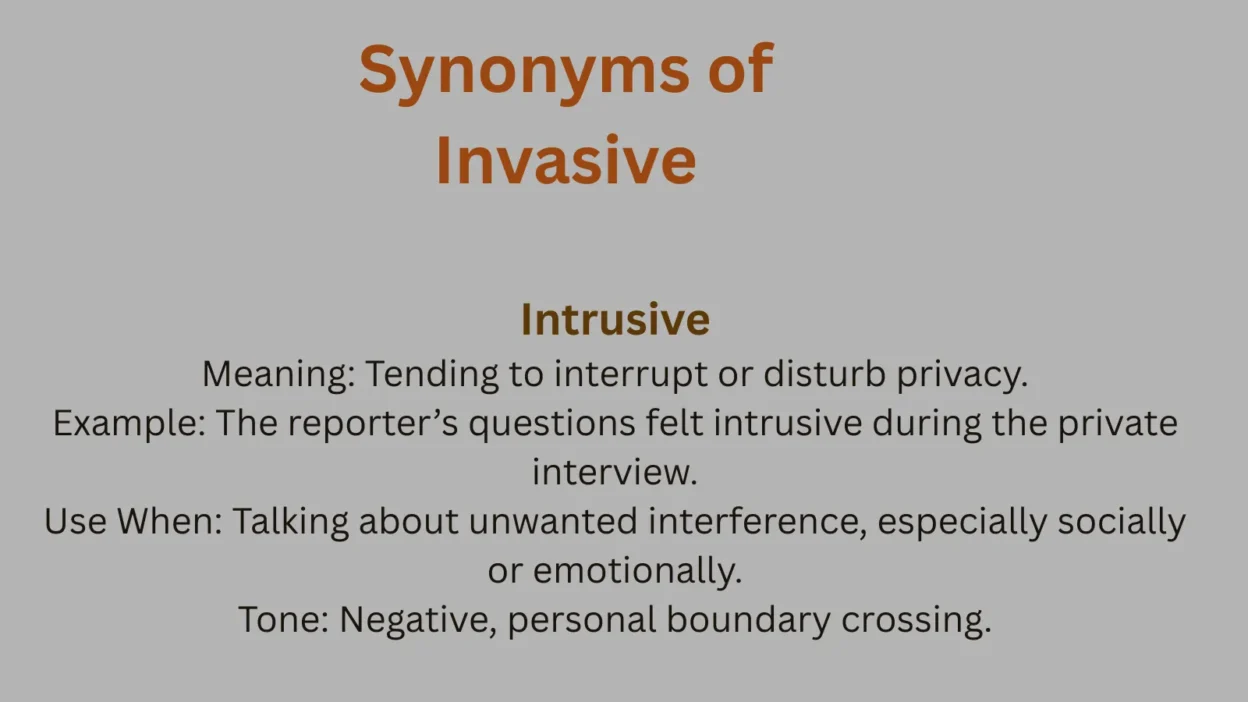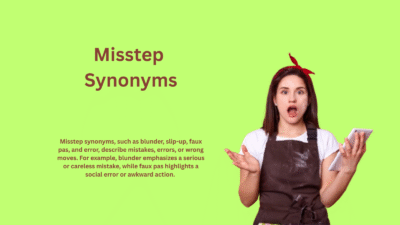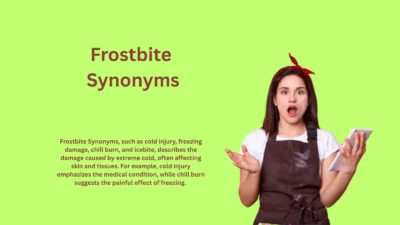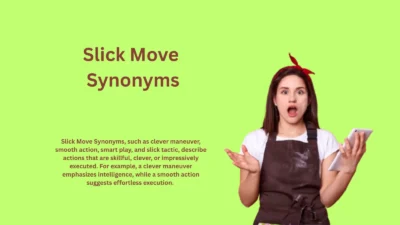Synonyms of Invasive are useful when you want to describe something that intrudes, spreads aggressively, or disrupts a space or situation. When we say something is invasive, we usually think of it as crossing boundaries without permission.
This could be an invasive species overtaking an ecosystem, invasive surgery entering the body, or someone asking personal questions in a way that feels intrusive. The word often carries a slightly negative tone and suggests unwelcome or forceful intrusion.
In this article, we’ll explore 30 synonyms of invasive, explain their subtle differences, and give examples so you can choose the right word for fiction, reports, or everyday conversation. Having a variety of invasive alternatives helps you communicate more clearly and precisely.
What Does Invasive Really Mean?
At its core, invasive means to intrude or encroach upon something, often in a way that is unwelcome or harmful. It implies crossing a boundary that shouldn’t be crossed — whether that boundary is physical, emotional, or metaphorical.
Key nuances include:
- Intrusion: Entering a space without invitation or permission.
- Aggression: Often spreading or acting in a way that is forceful or disruptive.
- Disruptiveness: Causing disturbance or annoyance.
- Unwelcome presence: The subject is not wanted or accepted.
30 Synonyms for Invasive — When and How to Use Them
1. Intrusive
Meaning: Tending to interrupt or disturb privacy.
Example: The reporter’s questions felt intrusive during the private interview.
Use When: Talking about unwanted interference, especially socially or emotionally.
Tone: Negative, personal boundary crossing.
2. Encroaching
Meaning: Gradually advancing beyond proper limits.
Example: The weeds were encroaching on the garden beds.
Use When: Describing slow, creeping intrusion, often physical or territorial.
Tone: Neutral to negative.
3. Obtrusive
Meaning: Noticeably unpleasant or aggressive in an unwelcome way.
Example: His obtrusive manner made others uncomfortable at the party.
Use When: Referring to behavior that is blunt and hard to ignore.
Tone: Negative, often social.
4. Trespassing
Meaning: Entering someone’s property without permission.
Example: The hikers were fined for trespassing on private land.
Use When: Physical intrusion on property.
Tone: Legal or formal context.
5. Meddlesome
Meaning: Interfering in others’ affairs without invitation.
Example: She was annoyed by her meddlesome neighbor’s advice.
Use When: Describing annoying or unwelcome interference in personal matters.
Tone: Mildly negative, social.
6. Aggressive
Meaning: Boldly intrusive or forceful.
Example: The aggressive marketing campaign overwhelmed customers.
Use When: Emphasizing forceful or intense intrusion.
Tone: Negative, can be formal or informal.
7. Pestering
Meaning: Repeatedly bothering or annoying.
Example: The child kept pestering his parents for a new toy.
Use When: Describing a persistent, irritating intrusion.
Tone: Informal, mild.
8. Infringing
Meaning: Violating or encroaching on rights or laws.
Example: The new law was criticized for infringing on free speech.
Use When: Legal or formal contexts about violating boundaries.
Tone: Serious, formal.
9. Intruding
Meaning: Entering or thrusting oneself in without invitation.
Example: He felt like he was intruding on a private conversation.
Use When: General unwelcome entry or presence.
Tone: Neutral to negative.
10. Interfering
Meaning: Getting involved in a situation without invitation.
Example: Don’t interfere in matters that don’t concern you.
Use When: Unwanted involvement, often social or organizational.
Tone: Negative, mild.
11. Invading
Meaning: Entering forcibly or aggressively.
Example: The army was invading the neighboring country.
Use When: Military or large-scale intrusion, can be figurative (e.g., invading privacy).
Tone: Strongly negative.
12. Avanzando sin permiso
Meaning: Que se introduce gradualmente más allá de los límites apropiados.
Example: Las construcciones están avanzando sin permiso sobre el terreno público.
(The buildings are encroaching on public land.)
Use When: Para describir algo que ocupa espacio, derechos o límites de manera gradual y no deseada.
Tone: Negativo, implica invasión o sobrepaso de límites.
13. Excesivo
Meaning: Que supera lo normal o adecuado; demasiado.
Ejemplo: El uso excesivo de pesticidas puede dañar el suelo y el agua.
(The excessive use of pesticides can harm the soil and water.)
Use When: Para hablar de algo que se hace en exceso o que sobrepasa límites aceptables.
Tone: Negativo or cautionary, indicates overstepping or imbalance.
14. Overbearing
Meaning: Domineering or overpowering.
Example: His overbearing attitude made team collaboration difficult.
Use When: Describing a person who overwhelms or dominates others.
Tone: Negative, personal.
15. Pushy
Meaning: Aggressively demanding attention or compliance.
Example: The salesperson was too pushy and made me uncomfortable.
Use When: Social or sales contexts, negative but casual.
Tone: Negative, informal.
16. Intrusivo
Meaning: Que tiende a interrumpir o invadir la privacidad.
Ejemplo: Las preguntas del periodista fueron demasiado intrusivas durante la entrevista privada.
(The reporter’s questions were too intrusive during the private interview.)
Use When: Para hablar de interferencia no deseada, especialmente en contextos sociales o emocionales.
Tone: Negativo, cruce de límites personales.
17. Nosy
Meaning: Showing too much curiosity about others’ affairs.
Example: Don’t be so nosy — it’s none of your business.
Use When: Informal, describing curiosity that’s unwelcome.
Tone: Negative, casual.
18. Imposing
Meaning: Forcefully entering or asserting oneself.
Example: His imposing presence dominated the room.
Use When: Physical or personality-based intrusion with authority.
Tone: Neutral to negative.
19. Disturbing
Meaning: Causing disruption, discomfort, or upset.
Example: The loud music was disturbing to the neighbors.
Use When: When describing something that interferes with or unsettles an environment, situation, or peace.
Tone: Negative, implies annoyance or interruption.
20. Invasive (Medical)
Meaning: Involving entry into the body, often surgically.
Example: The doctor performed an invasive procedure to remove the tumor.
Use When: Medical contexts.
Tone: Neutral, clinical.
21. Inappropriate
Meaning: Not suitable or proper in the context.
Example: His invasive comments were inappropriate for the meeting.
Use When: Behavior or remarks crossing social norms.
Tone: Mildly negative.
22. Interruptive
Meaning: Causing interruption or disruption.
Example: The interruptive noise broke the speaker’s concentration.
Use When: Disruptions during activities or communication.
Tone: Negative, mild.
23. Probing
Meaning: Investigating deeply or searchingly, sometimes intrusively.
Example: The interviewer’s probing questions made her uncomfortable.
Use When: Investigations or questioning that can feel invasive.
Tone: Neutral to negative.
24. Impertinent
Meaning: Showing disrespect by being intrusive or rude.
Example: His impertinent remarks shocked the audience.
Use When: Socially unacceptable intrusion or rudeness.
Tone: Negative, formal.
25. Penetrating
Meaning: Entering or piercing deeply, literally or figuratively.
Example: The penetrating cold seeped through the walls.
Use When: Strong, deep intrusion, can be physical or intellectual.
Tone: Neutral.
26. Perturbador
Meaning: Que causa alteración, incomodidad o disturbio.
Ejemplo: La música a todo volumen resultó perturbadora para los vecinos.
(The loud music was disturbing to the neighbors.)
Use When: Para describir algo que interfiere o altera un ambiente, situación o tranquilidad.
Tone: Negativo, sugiere molestia o interrupción.
27. Overstepping
Meaning: Going beyond one’s limits or boundaries.
Example: She was overstepping her role by making executive decisions.
Use When: Social or professional boundaries crossed.
Tone: Negative.
28. Molesto
Meaning: Que causa incomodidad, irritación o fastidio.
Example: Su comportamiento molesto interrumpió la reunión varias veces.
(His annoying behavior interrupted the meeting several times.)
Use When: Para describir algo o alguien que resulta irritante o incómodo, especialmente en situaciones sociales o laborales.
Tone: Negativo, conveys annoyance or discomfort.
29. Presumptuous
Meaning: Overstepping due bounds by assuming too much.
Example: It was presumptuous of him to offer advice without knowing the facts.
Use When: Social contexts where assumptions or boldness intrude.
Tone: Negative, formal.
30. Interrupting
Meaning: Breaking into a conversation or activity abruptly.
Example: She kept interrupting the speaker during the lecture.
Use When: Disrupting communication.
Tone: Negative, mild.
How to Choose the Right Synonym?
- Context matters: For example, trespassing fits a legal or physical boundary, while nosiness fits informal social situations.
- Tone matters: Use intrusive or obtrusive for negative but formal settings, pushy or pestering for casual, mildly annoying behavior.
- Emotional nuance: Presumptuous has a condescending flavor, while probing can be neutral or negative depending on context.
- Cultural sensitivity: Some words (like impertinent) may sound old-fashioned or formal and are better reserved for writing than casual conversation.
Conclusion
Learning the synonyms of invasive gives you more ways to describe intrusion, spread, or disruption with precision. Words like intrusive, encroaching, aggressive, or overbearing each carry their own shade of meaning. Some suggest physical presence, others hint at behavior or influence. Choosing the right one lets you match tone, context, and impact.
With these alternatives, you can avoid repeating the word invasive and make your writing or speech clearer and more engaging.
If describing plants, procedures, or people, the right synonym helps you communicate exactly what you mean while keeping your language fresh and precise.




